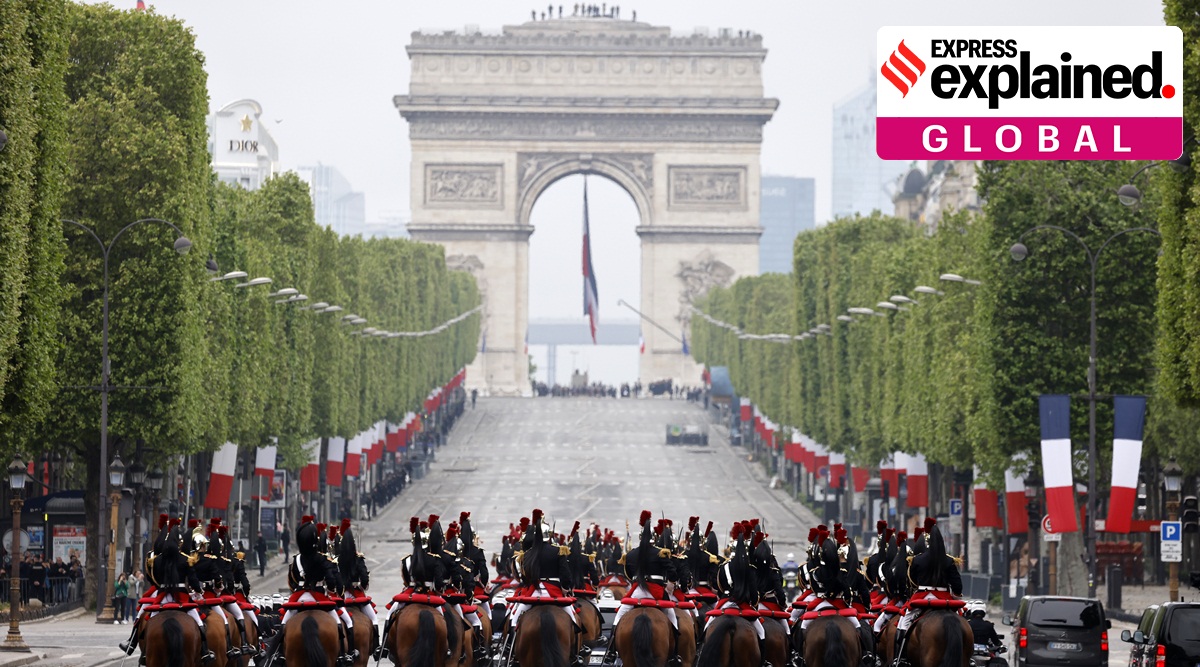EU in Israel cancels Europe Day event over Ben-Gvir: What is this day
On the continent too, the Russia-Ukraine conflict casts a long shadow on Europe Day celebrations this year.
 Members of the French Republican Guard ride horses up the Champs-Elysees avenue, with the Arc de Triomphe in background, during ceremonies marking the 78th anniversary of the victory against the Nazis and the end of the World War II in Europe, in Paris, Monday, May 8, 2023. (Ludovic Marin, Pool via AP)
Members of the French Republican Guard ride horses up the Champs-Elysees avenue, with the Arc de Triomphe in background, during ceremonies marking the 78th anniversary of the victory against the Nazis and the end of the World War II in Europe, in Paris, Monday, May 8, 2023. (Ludovic Marin, Pool via AP) The European Union’s delegation in Israel Monday (May 8) cancelled its Europe Day diplomatic reception over the planned participation of far-right Israeli minister Itamar Ben-Gvir, saying it “does not want to offer a platform to someone whose views contradict the values EU stands for.”
On the continent, the Russia-Ukraine conflict casts a long shadow on Europe Day celebrations this year. Russia has cancelled events in many regions, fearing Ukrainian shelling. On the other hand, in an attempt to break from its Soviet past, Ukraine has decided to observe Europe Day on May 8 (like Western Europe) rather than May 9 (like Russia).
Victory in Europe Day (V-E Day or simply, Europe Day) is one of the most important days in the history of Europe. It was on May 8, 1945 (May 9 in Eastern Europe) that the surrender of the German armed forces was formally accepted, bringing an end to a war that had killed millions on battlefields, across bombarded cities and in brutal concentration camps.
The fag end of the War in Europe
World War II officially began in 1939, with Germany’s invasion of Poland drawing Britain into the War. While Germany enjoyed initial success, conquering much of Western Europe and making inroads in the East, the Luftwaffe’s failure in the Battle of Britain, Hitler’s doomed invasion of Soviet Russia, and the entry of the US into the conflict in 1941 would soon turn the tide.
By 1945, Germany faced inevitable defeat. On the East, the Red Army marched towards Berlin with its enormous manpower and resource base. On the West, British, American and other allied troops hastened towards the German capital, after the successful D-Day landings on June 6, 1944. Germany’s biggest European ally Italy had collapsed and the Japanese were preparing for a lengthy campaign to defend their home islands, having lost most of the territory they had gained in the early years of the War.
Hitler’s death and German surrender
Thus, on April 30, 1945, as the Battle of Berlin raged on with both Soviets and Western Allies competing with each other to capture the city, German Fuhrer and Nazi Party supremo Adolf Hitler died by suicide.
Karl Donitz succeeded Hitler and immediately started negotiating a full surrender. The German Instrument of Surrender was signed on May 8, 1945 in Karlshorst, Berlin at 22:43 local time. It said, “The German High Command will at once issue orders to all German military, naval and air authorities and to all forces under German control to cease active operations at 23.01 hours Central European time on 8 May 1945.”
Celebrations across the Western World
Germany’s defeat sparked merry celebrations across the West, especially in Britain and North America. At last, a War which had shaped a generation, bringing about radical changes in society and politics, seemed over (Japan would not surrender for another few months). Crowds gathered at the Times and Trafalgar Squares alike, cheering and rejoicing.
Yet, celebrations in mainland Europe were more muted. Having borne the brunt of the German occupation and Nazi atrocities, it was not easy to be jolly, even in victory.
Europe Day today
However, today, almost every European country marks V-E Day, in remembrance of a War which killed at least 40-50 million people in the continent (including the Soviet death toll). In some countries, Europe Day is a national holiday. People across Europe mark the day by flying national flags or white “peace” flags.
In Russia and former Soviet countries, VE Day is marked with military parades and a display of the nation’s armed strength. In Germany, it is celebrated as a sombre occasion, a reminder of the path the country briefly took and a commemoration of the bravery and sacrifice of those within Germany who stood up to the Nazi regime.
- 01
- 02
- 03
- 04
- 05






































